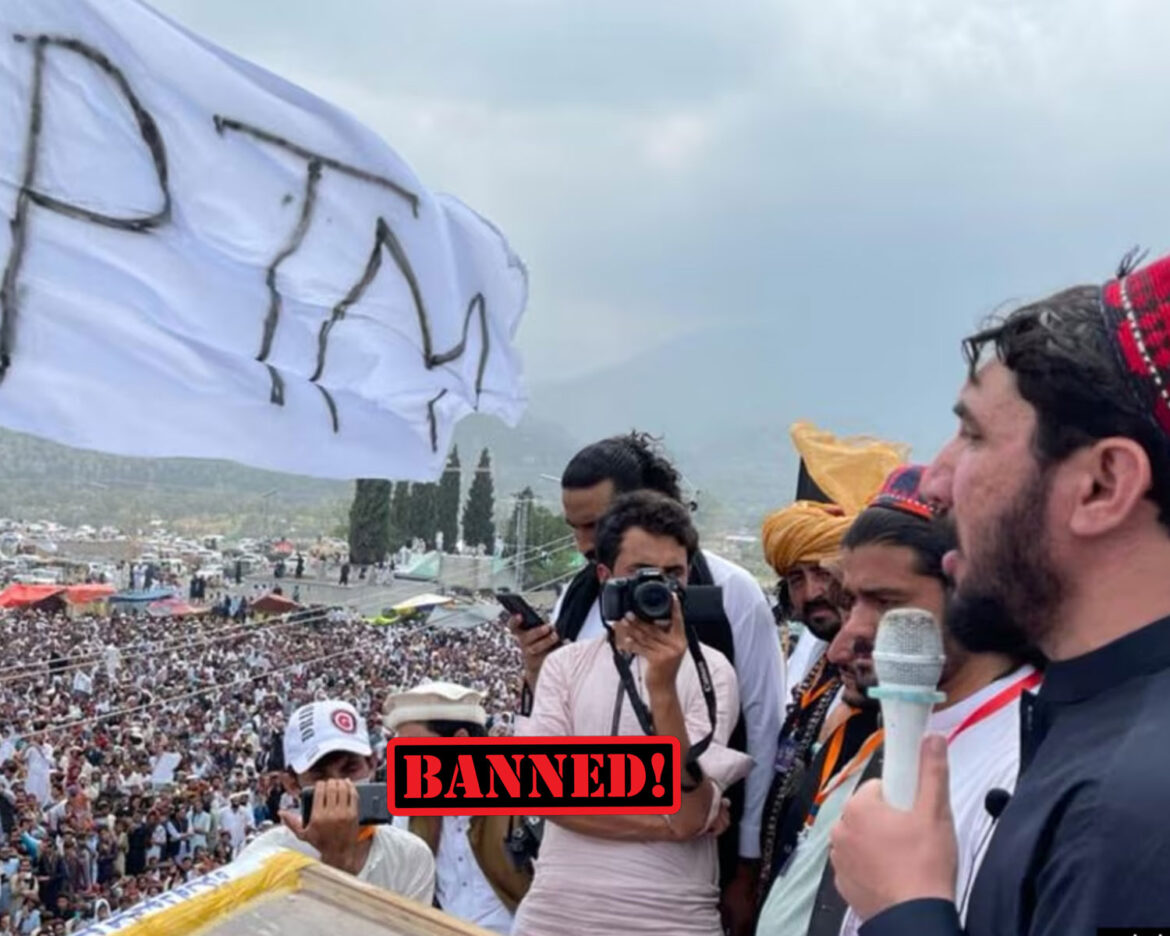Islamabad, October 6, 2024 — In a controversial and bold move, the Government of Pakistan has announced a nationwide ban on the Pashtun Tahafuz Movement (PTM), a grassroots political and human rights organization that has been at the forefront of advocating for the rights of Pashtuns, a historically marginalized ethnic group in the country. The announcement was made through a formal notification issued by the Ministry of Interior, which cited “national security concerns” as the primary justification for the decision.
The PTM, which rose to prominence in 2018, has been vocal in its criticism of the military’s presence in tribal areas, the enforced disappearances of activists, and the killing of civilians during counter-insurgency operations. The movement also demands greater accountability and justice for those affected by violence in Khyber Pakhtunkhwa and Balochistan.
In a statement, the Interior Ministry labeled the PTM as an “illegal organization” that has been involved in “anti-state activities,” accusing the group of undermining Pakistan’s sovereignty and stability. The government has also frozen the movement’s assets and prohibited its leaders from holding public rallies or addressing gatherings.
The Reaction
The decision has sparked widespread condemnation, both within Pakistan and internationally. PTM supporters, including activists, students, and human rights organizations, have called the move an “authoritarian crackdown” and “an attack on free speech and peaceful dissent.” Prominent PTM leaders, including Manzoor Pashteen and other activists, have expressed outrage, asserting that the government is trying to silence legitimate demands for justice and equality.
In an emotional statement, Pashteen called the ban a “disastrous decision” and vowed to continue the struggle for the rights of Pashtuns despite the crackdown. He added, “The government cannot stop our voices with bans or repression. The Pashtun people will not remain silent in the face of injustice.”
Human rights groups, including Amnesty International and Human Rights Watch, have condemned the move as a violation of fundamental freedoms, warning that it could further escalate tensions in the restive regions of Khyber Pakhtunkhwa, Balochistan, and the Federally Administered Tribal Areas (FATA). They have called on the government to reverse the decision and engage in dialogue with PTM leaders to address the grievances of the Pashtun community.
The Government’s Position
In response, government spokespersons have defended the ban, claiming it is necessary for ensuring peace and stability in the region. “The PTM’s rhetoric and actions have been divisive, and some of their activities have crossed the line into anti-state behavior,” said a senior official in the Ministry of Interior. “The ban is not about silencing dissent but about safeguarding the integrity of the state and preventing the exploitation of vulnerable communities.”
The government also pointed to recent instances where PTM demonstrations have led to violent clashes with security forces, further fueling concerns over the group’s potential to incite unrest.
Impact on Pashtun Activism
The PTM ban is likely to have far-reaching consequences for Pashtun activism in Pakistan. The movement, which initially garnered widespread support for its calls for justice, accountability, and an end to military oppression in Pashtun-majority areas, has grown into a powerful symbol of resistance against the state’s treatment of ethnic minorities.
Critics of the ban fear that this will drive the movement underground, potentially fueling more radical forms of resistance, while also alienating a significant segment of the population in Pashtun-dominated regions.
International Reactions
The international community has reacted with concern over the ban, with several countries and human rights organizations calling on Pakistan to respect the rights of its citizens to free expression and assembly. The United States State Department and the European Union have issued statements urging Pakistan to engage in dialogue with the Pashtun community and to address the underlying issues of political and economic marginalization that have driven the growth of movements like the PTM.
What Lies Ahead?
As the situation continues to develop, it remains to be seen how the PTM and its supporters will respond. The movement’s leaders have called for peaceful protests and sit-ins, but the government’s recent actions suggest that they will not tolerate any attempts to defy the ban.
In a country already grappling with political instability, economic challenges, and ongoing conflicts in Balochistan and the tribal areas, this latest escalation between the state and ethnic minority groups threatens to deepen divisions within Pakistan’s already fractured political landscape.
For now, the future of the Pashtun Tahafuz Movement remains uncertain, but one thing is clear — the struggle for Pashtun rights in Pakistan is far from over.



